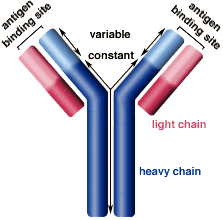Antibody definition and immune system

Antibody definition
Antibody is a unique molecule that binds with a specific ANTIGEN so the IMMUNE SYSTEM can neutralize or destroy the antigen. Antigens are molecular markers on the surfaces of cells that identify the cells to the immune system. Antibodies are the immune system’s infantry, patrolling the BLOOD and LYMPH circulations and responding to fight INFECTION when invading pathogens breach the barriers intended to keep them out of the body. Every time the immune system encounters new antigens it crafts new antibodies-a distinct and unique antibody for each antigen. Though antibodies all derive from IMMUNOGLOBULIN E (IgE), each kind of antibody binds only with its specific antigen. The immune system has the capacity to produce millions of unique antibodies.
B-cell lymphocytes, a type of white blood cell (LEUKOCYTE), produce antibodies each time the immune response presents a foreign antigen. Once sensitized to a specific antigen and programmed to produce antibodies for it, the B-CELL LYMPHOCYTE becomes a plasma cell and circulates in the blood and lymph. Whenever the plasma cell encounters its antigen, it churns out antibodies and releases them into the blood and lymph. Thousands to millions of plasma cells are present in the body for each antibody the immune response generates.
The antibody response is the foundation of ANTIBODY-MEDIATED IMMUNITY, also called humoral immunity, the process by which the immune system prevents reinfection by specific pathogens. Vaccines manipulate antibody-mediated immunity by introducing weakened pathogens (such as viruses and BACTERIA) to stimulate B-cell lymphocytes to produce antibodies against them. The blood and lymph circulations then contain the antibodies though the person has never had the infection.
Blood tests for the presence of specific antibodies help doctors diagnose numerous health conditions and determine whether a person has immunity against viral infections such as RUBELLA (German measles) and infectious mononucleosis. Antibody testing is also a key step in determining the match potential between an organ transplant recipient and the donor organ.
For further discussion of antibodies within the context of the structures and functions of the immune system, please see the overview section “The Immune System and Allergies.”
See also ALLERGY; CELL-MEDIATED IMMUNITY; CELL STRUCTURE AND FUNCTION; COMPLEMENT CASCADE; GAMMAGLOBULIN; HYPERSENSITIVITY REACTION; MONOCLONAL ANTIBODIES (MABS); MONONUCLEOSIS, INFECTIOUS; ORGAN TRANSPLANTATION; PATHOGEN; VACCINE; VIRUS.